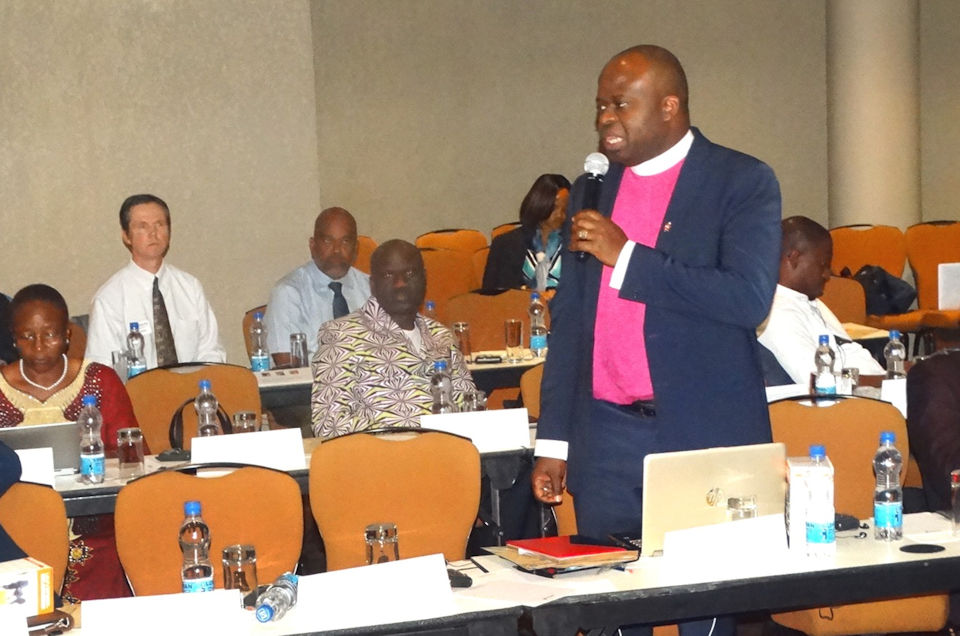PHILEAS JUSU
United Methodist News Service
United Methodist African bishops unanimously reaffirmed their view that marriage is between one man and one woman and vowed to “maintain the unity” of The United Methodist Church.
After a learning retreat Sept. 4-7 that included a closed executive session, the bishops issued a statement on their view of marriage.
But the bishops did not endorse any of the three proposals by the Commission on a Way Forward to resolve The United Methodist Church’s decades-long impasse over how to be in ministry with LGBTQ people.
“Which plan is chosen would be up to the General Conference delegates,” said Sierra Leone Area Bishop John K. Yambasu, president of the Africa College of Bishops.
Yambasu issued the statement on behalf of the bishops, who he said unanimously supported the traditional view of marriage. He said the bishops had a long discussion about the “challenges posed by the issue of human sexuality and the ongoing tensions that are ripping the denomination apart, including the potential impacts on the African church in particular.”
“We discussed at length how we as bishops can lead the whole church in Africa towards sustainability,” the statement said.
But the bishops said they would not “support any legislation that calls for the dissolution of The United Methodist Church” and stressed their commitment to a connectional, worldwide church that is committed to “Making disciples of Jesus Christ, for the transformation of the world.”
A report by the Way Forward Commission, appointed by the Council of Bishop after the 2016 General Conference to resolve the impasse over sexuality and help find ways for the denomination to stay united, contains three plans for the future of the church. The commission’s report will be taken up at the special called 2019 General Conference in St. Louis, Missouri.
Nigeria Area Bishop John Wesley Yohanna cited the creation story of Adam and Eve in stressing that “homosexuality remains incompatible with the teachings of Scripture.”
“Marriage is between man and woman because when man was created, he was alone (Genesis 2) and God saw that it was not good…. So, God formed a woman,” Yohanna told UMNS.
He referred to previous statements issued by the African bishops in 2016 and 2018 that spelled out their belief that “homosexuality is incompatible with Scripture.”
They also discussed the leadership role bishops can play in attaining sustainability for potential breakup — an issue Yambasu addressed at the meeting of the extended cabinet last year, when he urged the African church to move away from relying on financial support from the U.S. and others.
The bishops stressed that they remain faithfully committed to their consecration vows to support “maintaining the unity of the church” and absolutely dissociate themselves from any resolution that might lead to a permanent breakup.
The African bishops pledged that the church in Africa would remain as The United Methodist Church even in the worst-case scenario of a denominational split.
“Our church is at crossroads. And we are preparing for the special session of the General Conference. We are praying that in that special session, delegates will be able to deliberate and we’d manage to remain as one church. As a bishop, I promote unity,” said East Africa Bishop Daniel Wandabula.
He added that the church in Africa is growing and must continue focusing on making disciples of Jesus Christ. He emphasized that the church in Africa should work more towards becoming self-governing, self-propagating and self-supporting.
While the African bishops believe that both the Bible and the Book of Discipline say marriage is between “one man and one woman,” he wants to see unity.
“But also, we are praying for the West. What I want to see as a bishop in this denomination is unity. I see homosexuality as one of the many sins. So, I don’t separate one sin from the other. What we need to do is to preach the gospel of Jesus Christ. And Christ says come the way you are. And when you accept you’re a sinner, then the Holy Spirit works through you and you become a new creation; you can change,” he said.
The bishops heard several speakers and presentations about leadership and the work of the church’s boards and general agencies.
Bishop Arnold C. Temple, president of the All Africa Conference of Churches, called for the church to work for reconciliation in Africa, and he encouraged the college of bishops to begin a process for bringing together the different branches of Methodism.
Leslie Scott, former Sierra Leone national director of World Vision, spoke about how church leaders must use advocacy. He said churches are respected around the world, and church leaders must advocate for the underprivileged.
He said bishops are powerful, but that most of the time, the church fails to use that power. He added that those advocating for change must pray and arm themselves with facts and figures.
Julius Spencer, a university lecturer and chief executive of a private media firm, was Sierra Leone’s minister of Information and Communication during the 1991-2002 civil war.
He urged the bishops to lead by example, which he said has a powerful effect on followers. He gave the example of General Maxwell Khobe, a Nigerian military leader who headed the Economic Community of West African States military wing, who led forces against rebels who had taken over Freetown in 1998.
Dan Krause, top executive of United Methodist Communications, told the bishops that the agency has spent $2.5 million since 2006 to promote communications in Africa. Krause spoke about training events and other work the agency has done in Africa.
The Rev. Beauty R. Maenzanise, manager of Global Formation for New Spiritual Leaders at the United Methodist Board of Higher Education and Ministry, spoke about the need for collaboration and partnerships among United Methodist general agencies, particularly in the area of theological education in Africa.
Last Updated on October 31, 2023

